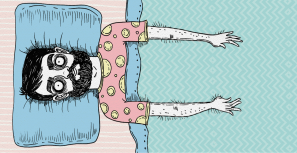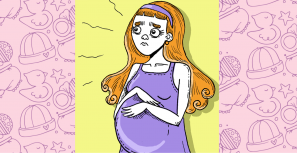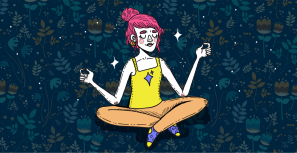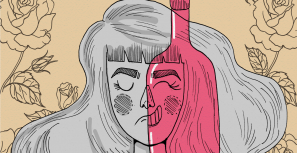如果你是焦虑或遭受一个anxiety condition, chances are you don't find it very easy to fall asleep. Relaxing your mind at the end of a full day is challenging at the best of times, but when you also have anxiety to contend with, you may find yourself physically and mentally challenged when trying to convince your body to sleep.
Being anxious during the day is tiring, which makes it all the more important to make sure you don't have to deal with it at night when your body is trying to recover. This article will cover the causes and effects of pre-sleep anxiety, as well as tips for effectively shutting down your anxiety at the end of the day.
Falling Asleep and Anxiety
The time before you go to sleep is a difficult one for anxiety sufferers. This is because all the worries you have accumulated over the course of the day choose now to float through your mind. Being alone in a dark room doing nothing but lying there with your worries allows you no distractions from them, which often allow them to seem to grow bigger and bigger and spiral out of control.
Causes of Anxiety Before Sleep
Everyone experiences anxiety differently. Those that have anxiety when falling asleep may have that problem for their own unique reason. Some of the causes include:
- Focus on the Day— For some people, anxiety while falling asleep is caused by over-focusing on the stress caused by anxiety due to events occurring throughout the day. There also may be an anxious focus on what is to come the next day.
- Feeling Scared or Afraid— Some people feel scared or afraid for no apparent reason, although it may be linked to the dark. Those that have a fear of death or mortality may also have moments where they just feel scared, afraid, or sad in some ways. The act of falling asleep can sometimes feel scary for those with anxiety.
- Falling— Known as Hypnic Jerks, these muscle sensations that occur in the arms, legs, or whole body can create the sensation of falling or "not breathing". Often occurring during the first stage of sleep it can cause someone with anxiety to awaken in a panic. That anxiety can sometimes stick around.
- Rapid Thought Patterns— Those with anxiety tend to have thoughts that keep them awake and are difficult to calm. The longer those thoughts go on, the more anxious they may become.
- Poor Sleep Cycle——如果你有焦虑或麻烦aslee下降p for a long time then a pattern of poor sleep may have developed. Anxiety can cause you to not sleep well. Lack of sleep makes your more susceptible to stress. Stress causes anxiety and then anxiety leads to a lack of sleep and possibly insomnia. This cycle may leave you feeling as if you may never sleep, making sleep that much more difficult to attain.
These are only an introduction to the different issues that may cause anxiety when falling asleep. There are a variety of other reasons why a person with anxiety may struggle to fall asleep including something as simple as what you ate or drank before going to bed.
Effects and Symptoms of Nighttime Anxiousness
Anxiousness, when you are trying to get to sleep, causes both mental and physical struggles. See if these descriptions of the types of problems encountered by anxiety sufferers trying to get to sleep match up to your own experiences.
- Restlessness -You may find yourself tossing and turning as you try and get to sleep because your body refuses to relax, and must continue trying to find a comfortable position. You may find yourself too hot or too cold, the blankets or pillows are uncomfortable, blood circulation isn’t feeling right, and so on. The discomfort keeping you awake will give you more of a chance to think about the negative, anxious thoughts that can keep you up at night.
- Panic Attacks -A panic attack before sleep may be characterized by sweating, a rapid heart rate, rapid breathing, and chest pain. These symptoms can be alarming because they mimic some of the symptoms of a heart attack, and may trigger the panicked belief that you are about to die (imagining that you are in physical danger or about to die is common during panic attacks). Panic attacks can also awaken you from sleep and then, due to a heightened state of arousal and anxious thoughts, make it difficult to fall back asleep, causing insomnia.
- Nightmares and Night Terrors -Nightmares and night terrors are two separate experiences however are so common that one out of every two adults experiences them on occasion. Night terrors happen in the first few hours after falling asleep and are not typically associated with dreams but rather with feelings, leaving the person unsure of why they woke up in terror. Nightmares are most often linked to REM sleep and dreams. As night goes on your REM sleep get longer meaning that nightmares typically occur in the early morning hours when REM sleep is at its longest.
- Falling/Twitching -You may also find that you experience anxiety as a result of weird sensations you get while trying to fall asleep. Those with stress, for example, are more prone to this feeling as though their body is jolting them awake right before they're about to fall asleep. Scientists are not clear what causes this but know for a fact it's harmless. Known as hypnic jerks these involuntary muscle sensations occur during the first stage of sleep, when you are in the lightest stage of sleep. You are suddenly jerked awake which can cause anxiety, making it harder to fall asleep in the future.
- Limited REM -All these effects add up to a very limited REM cycle. Most people get 80% non-REM and 20% REM sleep in a night. REM sleep only occurs after some non-REM sleep has taken place. Therefore, if it takes you a long time to get to sleep or you wake up soon after you do, you don't have as much time in the night to achieve that REM stage. Regular REM sleep is required to maintain a healthy mind and body.
If you are experiencing any of these symptoms when trying to sleep, you should take the steps outlined below to help you escape the torture of being too anxious to get a good night's sleep.
How to Minimize Anxiety and Maximize Sleep
To get to sleep more easily, you can try changing some of your pre-sleep habits to decrease your mental and physical stress levels. Habit-changing takes time and persistence, but if you stick to these changes, you will find yourself adapting and feeling less anxious overall in no time.
- Time Travel- This is a fancy way of saying that at least an hour before you want to get to bed, you should try to turn everything off and do something that engages more of your mind than, for example, gazing at your computer or the television screen. Dimming the lights helps alert your brain to the idea that it should be sleeping soon. Doing something casual that still forces your mind to engage, such as reading, drawing, or playing cards will help occupy your brain with something other than the worries of the day when it is time to lay down your head.
- Pick a Bedtime- Deciding on a particular hour that you want to be in bed by will relax your body by providing it with a comforting, familiar routine to follow. It will also train your brain to get tired at a certain time of night, which will help you fall asleep sooner after you lay down to do so.
- Keep a Journal- Writing in a journal is another routine you can follow (and a good one to incorporate into your pre-bedtime time travel, as it doesn't involve any technology). Sometime before bed, jot down some thoughts about your day. If any worries or problems come up, be sure to write them down with possible solutions to accompany them. Once you do this, shut the book and imagine you are symbolically shutting away all the cares and thoughts from the day until you next want to open the journal and look at them.
- Consciously Relax Your Body- Once you are lying down in bed, try relaxing your body one piece at a time. Start at your toes, relaxing each toe individually. Then move up to your ankles, your calves, your thighs, and so on. Make sure each part is thoroughly relaxed before moving on to the next. You may start to feel tingly and almost numb. This is good: it means your body is getting ready to sleep. Once you are completely relaxed, focus on breathing comfortably and slowly until you fall asleep.
- Reserve Your Bed For Sleep- Avoid doing non-bed-related things on your bed: for instance, texting, going online or doing homework. The more you reserve your bed for sleep, the more your mind will associate it with sleep, and the easier it will be to fall asleep on.
- Get Up and Walk Around -If you find that your anxiety is too strong, don't keep trying to sleep. Distract yourself for a while by cleaning the house or reading a book. Falling asleep when your anxiety is that strong is very difficult, so giving yourself a distraction and then trying again later may prove helpful.
- White Noise -Some type of white noise, calming music, or easy to ignore radio may also be helpful. Often these things can distract your senses, making it harder for you to focus on your anxious thoughts. Try something like talk radio, with a volume so low that you can only hear what they're saying if you try extremely hard. The noise and talking will make it much more difficult to focus on your anxious thoughts.
避免让你获得t的焦虑he sleep you need can be difficult, but following the above all-natural and healthy techniques may be all that you require taking back control over your sleep schedule.











